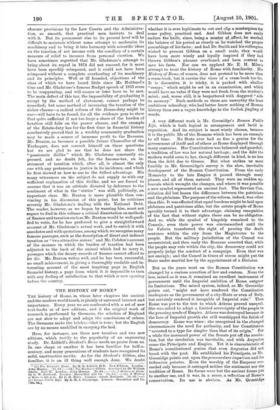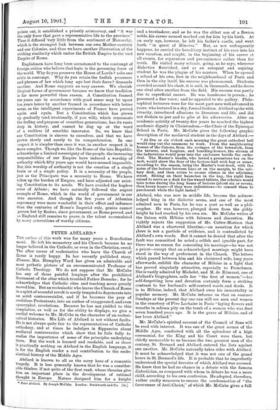THE HISTORY OF ROME.* THE history of Rome, in whose
later chapters the ancient and the modern world touch, is plainly of universal interest and importance. Every year we are confronted with a set of new text-books or of new editions, and if the original work of research is performed by Germans, the scholars of England are not slow to adopt and adapt the conclusions of others. The Germans make the bricks,—that is true; but the English are by no means unskilled in carrying the hod.
Here, for instance, are three new treatises and two new editions, which testify to the popularity of an engrossing study. Dr. Liddell's Student's Rome needs no praise from us. In one shape or another it has been familiar for half-a- century, and many generations of students have recognised its solid, unattractive merits. As for the Student's Gibbon, also familiar, it. is an ill thing well enough done. We doubt • (1.) Ths Student's Rome. By H. G. Liddell, D.D. New Edition. Loudon : John Murray. [7s. &1]—(2.) the Student's Gibbon. Abridged by Dr. William Smith. Part U. London: John Murray. [7e. 6d..]—(3.) .4 History of Rome. By G. W. Botsford.. Loudon : Macmillan and Co. [es. ed.] —(44 A History of Rome to diXt A.D. By E. H. Miles. Loudon : Grant Richards. [Se. &l.]— 0.) flomaa Public We. By A. H. J. Greenidge. Loudon Elacinilmu and Co.
dd..1
whether it is ever legitimate to cut and clip a masterpiece for some paltry, practical end. And Gibbon does not easily endure the knife, since, being a maotfgr 5Ceffect, he marked the balance of his period as closely as he watched the Proper assemblage of his facts ; and had. Dr. Smith and his colleagues wished to present Gibbon on a small scale, they, would have been more wisely and loyally inspired if they had thrown Gibbon's phrases overboard, and been content to save his facts. Nor can we applaud Mr. E. H. Miles's attempt to treat the history of Rome with familiarity. His History of Rome, of course, does not pretend to be more than a cram-book, but it carries the vices of a cram-book too far. It is' discursive, it is tricky, it is packed with shallow " essays," which might be set in an examination, and which would have no value if they were not fresh from the student's mind; and, worse still, it is bespattered with doggerel "aids to memory." Such methods as these are unworthy the least ambitious schoolboy, who had better know nothing of Roman history than owe a vague knowledge to the foolish jingling of words.
A very different work is Mr. Greenidge's Roman Public Life, which is both logical in arrangement and lucid in exposition. And its subject is most wisely chosen, because it is the public Me of the Romans which has been an example to all time. No State ever had so fine a genius for the government of itself and of others as Rome displayed through many centuries. Her Constitution was balanced and guarded; a tradition of law was her natural heritage ; and the debt the modern world owes to her, though different in kind, is no less than the debt due to Greece. But what strikes us most forcibly in Mr. Greeenidge's survey is the slow, inevitable development of the Roman Constitution. From the early Monarchy to the late Empire it passed through many phases, and all of them naturaL They were no sudden up. heavals which wrought the changes, and where it was possible a new symbol represented an ancient fact. The Servian Con. stitution did but lessen the difference between the patricians and the plebeians. The purpose of the reform, indeed, was other than this. It was effected that equal burdens might be laid upon plebeians and patricians alike, but the astute people' of Rome speedily turned it to their advantage, claiming recognition of the fact that without rights there can be no obligation. And so, while the symbol of kingship remained to the Consuls, even their power was circumscribed until the Zen Valeria transferred the right of passing the death sentence within the city from the Magistrates to the people. But the military jurisdiction of the Consul was unrestricted, and thus early the Romans asserted that, while the people may rule within the city, the democracy could not properly judge the conduct of a campaign. Even that was not enough; and the Consul in times of stress might put the State under martial law by the appointment of a Dictator.
But as the years went on the Roman Constitution was changed by a curious accretion of law and custom. None the less, mixed as it was, it remained an excellent instrument of government until the Imperial ambition of Rome outgrew its limitations. The mixed system, indeed, as Mr. Greenidge points out, " might not have rendered the Constitution inadequate as the government of a city-State or even of Italy, but certainly rendered it incapable of Imperial rule." Thus Rome was put to the test to which Athens proved unequal. She was asked to adapt a limited sovereignty of the people to the pressing needs of Empire. Athens was destroyed because in the face of Imperial growth she still worshipped the fetish of democracy. Rome was wiser : she recognised in, the changed circumstances the need for authority, and her Constitution "reverted to a type far simpler than that of its origin." For a while the increased power of the Senate put off the revolu- tion, but the revolution was inevitable, and with Augustus came the Principate and Empire. Yet it is characteristic of Rome's constitutional genius that even Augustus did not break with the past. He .established his Principate, as Mr. Greenidge points out, upon theproconsulare imperium and the tribunicia potestas. Even the worship of the Emperor suc- ceeded only because it outraged neither the sentiment nor the tradition of Rome. Its forms were but the ancient forms put to another use, and it was, in a sense, a reflection of Rome's conservatism. Its use is obvious. As Mr. Greenidge
points out, it established a priestly aristocracy, and " it was the only force that gave a representative life to the province." Thus it differed' `verb* from the sentiment of Monarchy, which is the strongest link between our own Mother-country and our Colonies, and thus we have another illustration of the striking similarity which unites the British Empire to the vast Empire of Rome.
Englishmen have long been accustomed to the contempt of foreign critics who believe that logic is the governing force of the world. Why do you preserve the House of Lords ? asks one critic in contempt. Why do you retain the foolish processes and phrases of law which long ago lost their force? demands another. And Rome suggests an easy answer. We cherish illogical forms of government because we know that tradition is far more powerful than reason. A Constitution framed ten years ago in accordance with good sense may be upset ten years hence by another framed in accordance with better sense, as the intelligent experiments of France have proved again and again. But a Constitution which has grown up gradually (and irrationally, if you will), which represents the feeling and purpose of countless generations, has its roots deep in history, and cannot be dug up at the word of a reckless (if sensible) innovator. So, we know that our Constitution is sincere to ourselves, and that we have grown slowly and surely to its comprehension. In one respect it is simpler than once it was, in another respect it is more complex. Though we, like the Rome of the late Republic, acknowledge a limited sovereignty of the people, the increasing responsibilities of our Empire have induced a worship of authority which fifty years ago would have seemed impossible. But this worship of authority is not the creation of a single brain or of a single policy. It is a necessity of the people, just as the Principate was a necessity to Rome. We have taken up the burden of Empire, and have adjusted our exist- ing Constitution to its needs. We have avoided the hapless error of Athens; we have naturally followed the august example of Rome, which in the world of government is our true ancestor. And though the few years of Athenian supremacy were more wonderful in their effect and influence than the centuries of Rome's Imperial rule, genius cannot govern but by flashes, since government, as Rome proved, and as England still remains to prove, is the talent accumulated by many generations of worthy citizens.



































 Previous page
Previous page